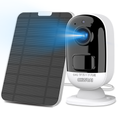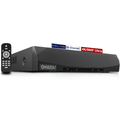Introducing the Smart Advantage of Intelligent Anti-Overexposure Infrared Cameras
In the field of video surveillance, infrared lighting was not widely used in the past. However, with the increasing crime rates in today's society, the role of infrared lighting in nighttime monitoring has become more prominent. Infrared lighting is not only employed in critical areas such as vaults, oil storage facilities, armories, libraries, cultural relics departments, and prisons, but also in general surveillance systems. Even residential areas now incorporate infrared cameras into their TV monitoring projects. This demonstrates the growing demand for standardized and high-quality video surveillance systems that can provide continuous monitoring 24/7.
The realization of night vision can be achieved through conventional visible light illumination. However, this method is not discreet and may expose the surveillance targets. To ensure covert night vision, infrared camera technology is commonly utilized. Infrared camera technology can be divided into passive and active infrared camera technologies. Passive infrared camera technology relies on the principle that all objects emit infrared light above absolute zero (273℃). Since human bodies and warm objects emit relatively strong infrared light, while other non-warm objects emit weak infrared light, special infrared cameras can be used for nighttime monitoring. However, due to the high equipment cost and the inability to reflect the surrounding environment, passive infrared camera technology is rarely used in night vision systems. On the other hand, active infrared camera technology uses specially designed "infrared lamps" to produce infrared radiation that is invisible to the human eye but can be captured by ordinary cameras. By utilizing low-light CCD black-and-white cameras or cameras with "day-to-night automatic black-and-white switching" or "infrared low-light color cameras," the surrounding environment can be monitored by the infrared light reflected back, enabling night vision capabilities.
The human eye cannot perceive infrared rays. In digital cameras, CCD sensors detect all light, resulting in images captured by digital cameras appearing different from what our eyes see. To address this issue, digital cameras are equipped with an infrared filter between the lens and CCD. This filter blocks infrared rays from reaching the CCD during the daytime, allowing the CCD to only sense visible light, thereby aligning the images captured by the camera with what our eyes see. Currently, most infrared cameras use LED infrared emitters as the primary infrared light source.
However, infrared cameras face certain challenges:
Inadequate Night Vision Effect: Some infrared cameras exhibit flashlight-like effects or limited range due to the angle and functionality of the infrared lamps. This issue is mainly influenced by the angle and power of the infrared emitter.
Insufficient Color Reproduction During Daytime: Infrared integrated cameras may experience color deviation during the daytime. The main reason for this phenomenon is the use of bimodal filters that allow a certain proportion of infrared light to pass through. This interferes with color reproduction when natural light contains a significant amount of infrared components, resulting in, for example, green plants appearing gray or white (especially evident in outdoor environments with sunlight). The use of IPCUT dual filters effectively solves this problem. The IRCUT dual filter consists of an infrared cutoff filter and a full-spectrum optical glass. During sufficient daylight, the infrared cutoff filter operates to restore true colors. At night when the light is insufficient, the infrared cutoff filter is automatically moved aside, and the full-spectrum optical glass starts working, allowing the CCD to fully utilize all light and significantly improve infrared performance.
Factors Affecting the Lifespan of Infrared Lamps: The energy consumed by the lamp partly converts into effective light energy, while the rest transforms into heat energy. This phenomenon is inevitable. The issue lies in the rational control and disposal of the generated heat. Excessive heat or lack of appropriate cooling measures can cause the lamp to age rapidly, leading to a rapid decrease in irradiation distance. Some manufacturers, in pursuit of short-term performance without considering product longevity, tend to neglect heat management. As a result, the lamp's lifespan is significantly reduced while emphasizing brightness and distance.
To address these challenges and meet customers' requirements for both color reproduction during the daytime and clear reception of infrared light at night, OHWOAI has recently launched two high-performance and cost-effective SmartLED infrared cameras, including conventional SmartLED color day-night infrared cameras and SmartLED D1 network infrared cameras. They incorporate leading SmartLED and digital noise reduction technologies, featuring dual filter day-night conversion capabilities. These unique qualities allow the cameras to perform exceptionally well during nighttime surveillance, producing clear and soft images.
The SmartLED infrared camera series also utilizes high-brightness LED chips from Japan. With high efficiency, long lifespan, and excellent infrared effects, they significantly extend the cameras' service life. Additionally, these cameras are housed in high-quality aluminum alloy casings with excellent anti-interference and heat dissipation properties, boasting an IP66 waterproof rating, effectively solving the problem of short infrared lamp lifespan. They are especially suitable for places that require the identification of facial features of monitoring objects at night, such as residential areas, property management, hotels, government agencies, mining areas, schools, and parking lots.
With OHWOAI's SmartLED infrared cameras, you can expect exceptional nighttime surveillance capabilities and superior image quality during the daytime. Trust OHWOAI to provide you with innovative and reliable security solutions that cater to all your surveillance needs.
Sample Block Quote
Nam tempus turpis at metus scelerisque placerat nulla deumantos sollicitudin delos felis. Pellentesque diam dolor an elementum et lobortis at mollis ut risus. Curabitur semper sagittis mino de condimentum.










